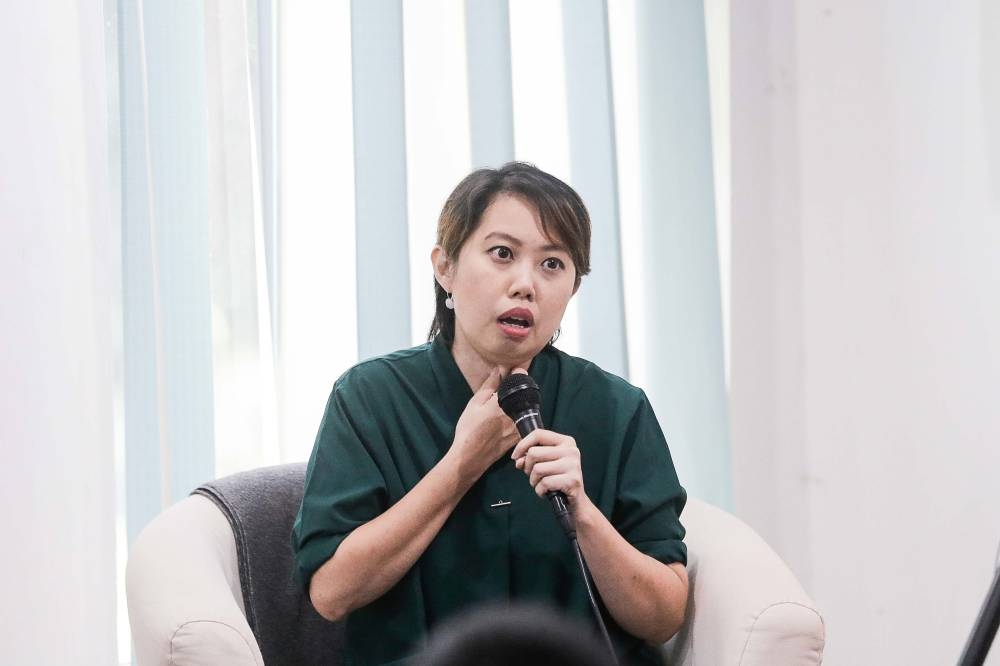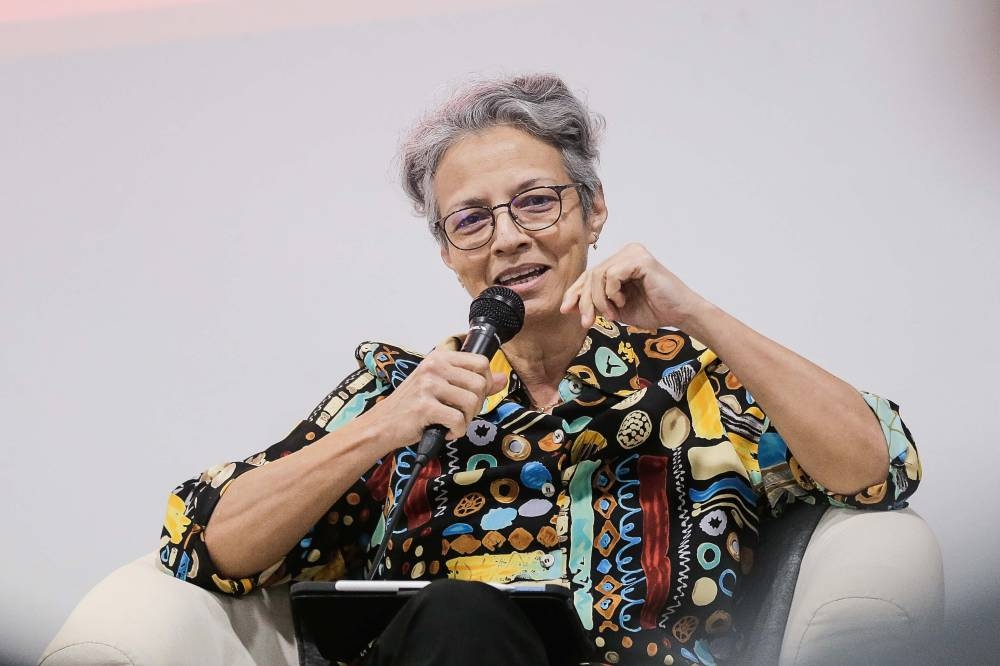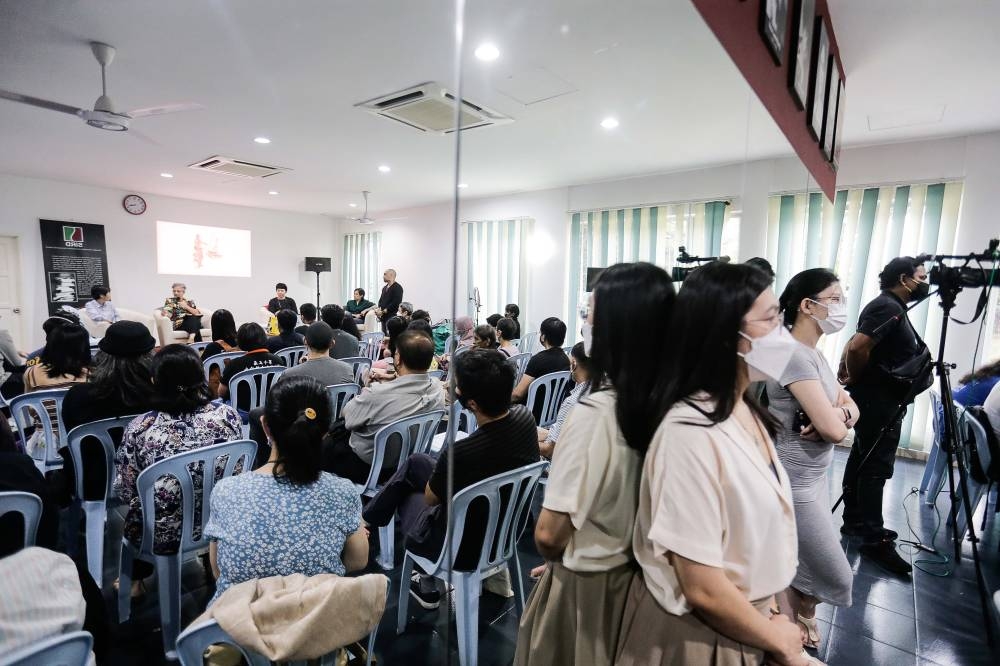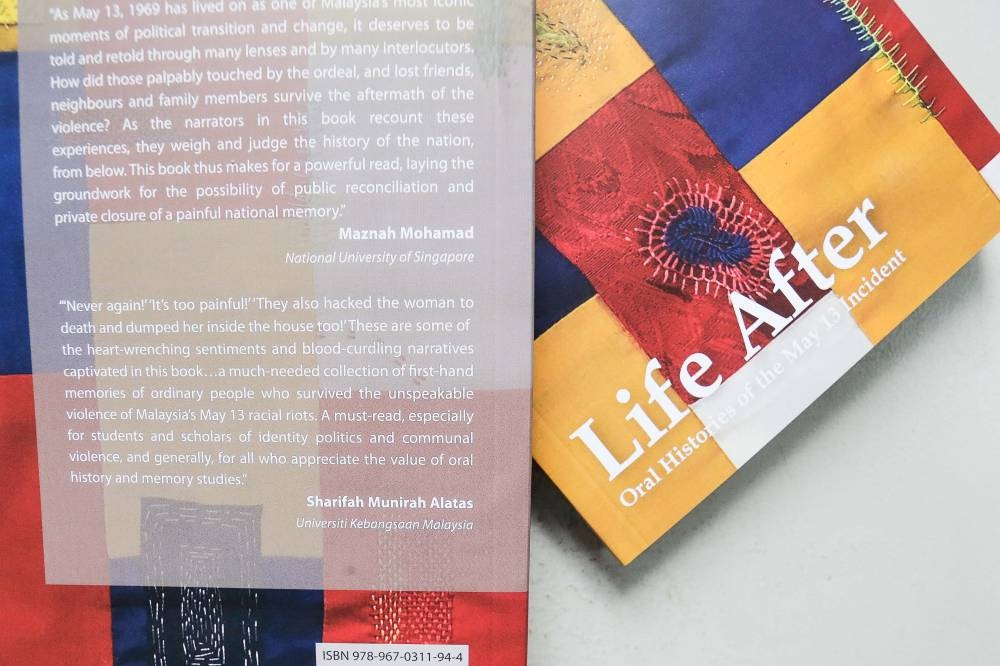With documentation of oral history, kin of May 13 survivors and academics call for closure

Visitors listening as the panelists deliver their testimonies during the 'Life After: Oral Histories of the May 13 Incident' book launching at Gerakbudaya, Petaling Jaya, January 7, 2023. — Pix by Sayuti Zainudin
Sunday, 08 Jan 2023 7:00 AM MYT
PETALING JAYA, Jan 8 — Journalist Tham Seen Hau has previously worked on stories of the May 13 racial riots in 1969 before, but clearing her aunt’s belongings in January last year seemed to have reopened new wounds.
Part of a team documenting the oral histories behind the black mark in the country’s history, Tham echoed the sentiments of many whose families were affected that the issue has yet to be addressed adequately.
“After she died last January, I have been clearing her stuff... and among them was close to a hundred textbooks and exercise books of her other siblings who had died in the incident,” Tham told the launch of a book on the oral histories.
The Kuala Lumpur-based journalist said her aunt lost five siblings during the strife, three of whom were school-going children.
“As I was going through all those textbooks, it gave me a clearer picture of how these uncles and aunties were, because there were short essays and drawings that they had done about one another,” she said, as her voice cracked from emotion.
Tham said that families of the survivors of the May 13 riots were starved of closure, with many choosing to keep silent over the years as they feared pushback.

Malaysiakini Journalist Tham Seen Hau delivering her talk as a panelist during the 'Life After: Oral Histories of the May 13 Incident' book launching.
The book titled Life After: Oral Histories of the May 13 Incident was co-authored with Universiti Sains Malaysia social scientist Por Heong Hong, the head of the Drama and Visuals Department at New Era College University Usen Leong, and media lecturer Tun Wan Qing.
The team calls itself the May 13 Oral History Group, and their book records the stories of 20 individuals and families who are survivors of the incident.
Por, who had interviewed most of the subjects, said she hoped her work helped create a more accurate and human-centric narrative of the events that occurred.
“Closure would come through the recognition and acknowledgement of the pain, so we need to talk about it,” she said, adding that victims of the riots had been made up of various ethnic backgrounds.
Guest speaker Sharifah Munirah Alatas, a lecturer at the Faculty of Social Sciences and Humanities at Universiti Kebangsaan Malaysia, said that there are many untrue narratives surrounding the incident pushed by politicians for their own benefit.
“What I think has happened over the past 50 years is a perpetuation of two myths that keep alive this idea that we shouldn’t talk about May 13, 1969.
“In my thinking, myth number one is if the Malays are unhappy, there will be riots. Therefore it is justified to keep these political structures going, the New Economic Policy (NEP) is justified, affirmative action is justified, and quotas are necessary to keep the Malays not unhappy.
“The second myth is that there can never be peace and harmony in a multiracial country,” she said, adding that the riots should not be considered as a “people’s problem” but rather a problem caused by politicians.

Lecturer at the Faculty of Social Science and Humanities, Universiti Kebangsaan Malaysia Sharifah Munirah Alatas delivering her talk as a panelist during the 'Life After: Oral Histories of the May 13 Incident' book launching.
Sunday, 08 Jan 2023 7:00 AM MYT
PETALING JAYA, Jan 8 — Journalist Tham Seen Hau has previously worked on stories of the May 13 racial riots in 1969 before, but clearing her aunt’s belongings in January last year seemed to have reopened new wounds.
Part of a team documenting the oral histories behind the black mark in the country’s history, Tham echoed the sentiments of many whose families were affected that the issue has yet to be addressed adequately.
“After she died last January, I have been clearing her stuff... and among them was close to a hundred textbooks and exercise books of her other siblings who had died in the incident,” Tham told the launch of a book on the oral histories.
The Kuala Lumpur-based journalist said her aunt lost five siblings during the strife, three of whom were school-going children.
“As I was going through all those textbooks, it gave me a clearer picture of how these uncles and aunties were, because there were short essays and drawings that they had done about one another,” she said, as her voice cracked from emotion.
Tham said that families of the survivors of the May 13 riots were starved of closure, with many choosing to keep silent over the years as they feared pushback.

Malaysiakini Journalist Tham Seen Hau delivering her talk as a panelist during the 'Life After: Oral Histories of the May 13 Incident' book launching.
The book titled Life After: Oral Histories of the May 13 Incident was co-authored with Universiti Sains Malaysia social scientist Por Heong Hong, the head of the Drama and Visuals Department at New Era College University Usen Leong, and media lecturer Tun Wan Qing.
The team calls itself the May 13 Oral History Group, and their book records the stories of 20 individuals and families who are survivors of the incident.
Por, who had interviewed most of the subjects, said she hoped her work helped create a more accurate and human-centric narrative of the events that occurred.
“Closure would come through the recognition and acknowledgement of the pain, so we need to talk about it,” she said, adding that victims of the riots had been made up of various ethnic backgrounds.
Guest speaker Sharifah Munirah Alatas, a lecturer at the Faculty of Social Sciences and Humanities at Universiti Kebangsaan Malaysia, said that there are many untrue narratives surrounding the incident pushed by politicians for their own benefit.
“What I think has happened over the past 50 years is a perpetuation of two myths that keep alive this idea that we shouldn’t talk about May 13, 1969.
“In my thinking, myth number one is if the Malays are unhappy, there will be riots. Therefore it is justified to keep these political structures going, the New Economic Policy (NEP) is justified, affirmative action is justified, and quotas are necessary to keep the Malays not unhappy.
“The second myth is that there can never be peace and harmony in a multiracial country,” she said, adding that the riots should not be considered as a “people’s problem” but rather a problem caused by politicians.

Lecturer at the Faculty of Social Science and Humanities, Universiti Kebangsaan Malaysia Sharifah Munirah Alatas delivering her talk as a panelist during the 'Life After: Oral Histories of the May 13 Incident' book launching.
Dengar dulu apa yang hendak dikemukakan, kata Hadi
PAS president Datuk Seri Abdul Hadi Awang today raised the spectre of the May 13, 1969 racial riots in defending the Islamist party's position against local council elections, which its ally DAP is seeking to restore.
DAP's insistence on holding local council elections could cause a deeper racial divide as well as tensions, especially in Chinese-majority areas, Hadi said in a statement today, adding that PAS rejected any move that could bring about a repeat of the May 13 riots.
Hadi said DAP's push for local government elections was a mistake as it was only advantageous to urban residents, who were mainly non-Malays.
"What more when we look at it from a racial aspect which could cause the gap to widen and polarisation to happen, as well as tensions between residents in a town with a Chinese majority.
"Just compare the RM250 million annual income of a local council in Selangor with the RM50 million of another local council in the same state where the majority is of a different race," Hadi said.
PAS president Datuk Seri Abdul Hadi Awang today raised the spectre of the May 13, 1969 racial riots in defending the Islamist party's position against local council elections, which its ally DAP is seeking to restore.
DAP's insistence on holding local council elections could cause a deeper racial divide as well as tensions, especially in Chinese-majority areas, Hadi said in a statement today, adding that PAS rejected any move that could bring about a repeat of the May 13 riots.
Hadi said DAP's push for local government elections was a mistake as it was only advantageous to urban residents, who were mainly non-Malays.
"What more when we look at it from a racial aspect which could cause the gap to widen and polarisation to happen, as well as tensions between residents in a town with a Chinese majority.
"Just compare the RM250 million annual income of a local council in Selangor with the RM50 million of another local council in the same state where the majority is of a different race," Hadi said.
The speakers made several suggestions on how to provide a sense of closure to survivors, including having annual memorials, as well as more artistic performances surrounding the incident to encourage conversation on the matter.
An audience of about 50 people came to the book launch at the Gerakbudaya bookstore here, and gave the speakers and co-authors a loud round of applause at the conclusion of the event.
Many thanked the co-authors for shedding light on the obscure and painful history of the riots.
Among the crowd was Chan Seong Foong, a 62-year-old, who said she still remembers when her grandmother and several of her young cousins were chased out of their homes and had to run to safety at a temporary shelter.
“We did not know if they were well until many days later,” she said, adding that she was eight years old when the riots happened.
Though good fortune kept all her family members safe at the time, Chan said that she is still traumatised by the events and by the fears passed down by her older family members, which made her keep silent on the issue for a long time.
“When schools reopened after the riots, the first thing my mother said was ‘when people ask you where you were and what you did during the incident just say you don’t know... don’t say you had a grandmother who had to run away and this and that’,” Chan said.
“I’m very happy that this [book launch] happened... I think similar talks and initiatives should be had, not just the old people, but the young people also,” she said.

The visitors listening as the panelists deliver their talk during the 'Life After: Oral Histories of the May 13 Incident' book launching.
Also among the audience was 28-year-old data engineer Shahriman Shahrul, who said he joined the book launch as he wanted to have more knowledge about the matter, especially after provocative videos on the riots surfaced on TikTok during the previous general election.
Following the 15th general election last year, social media users pointed to TikTok posts warning about a possible repeat of the deadly May 13, 1969 race riots with hundreds of thousand of views, most of them directed against supporters of Pakatan Harapan.
Among the hashtags used for the posts were affiliated with Perikatan Nasional, which is also attempting to form the federal government. The Malaysian Communications and Multimedia Commission (MCMC) and the police then summoned the representative of the platform for an explanation, after it was reported such videos were published on the platform as part of “paid partnerships”.
Engaged in an enthusiastic conversation with him was 29-year-old Nur Nadia Lukmanulhakim, a social science researcher, who said that she has been unsatisfied with the “official narrative” of what transpired during the troubled time.
“We need to push for a community-interpreted narrative, where the community feels that they can own that narrative, rather than an elitist narrative that is passed down to the people on the ground.
“The community needs to own the narrative, because it’s their memories, it’s their experience,” she added.

The 'Life After: Oral Histories of the May 13 Incident' book is pictured during its launching at Gerakbudaya, Petaling Jaya.
The official death toll of the May 13, 1969 riots, as recorded by the Malaysian government, was 196 people.
However, other sources, such as the book Declassified Documents on the Malaysian Riots of 1969 by activist Kua Kia Soong which cited correspondents from diplomats and foreign journalists back then, suggest that the official death toll was grossly understated, with some observers estimating that there were more than ten times the official number of deaths.
Life After: Oral Histories of the May 13 Incident was previously published in Chinese in 2020. A Malay translation is in the works.

 The Malaysian Insider
The Malaysian Insider
Expecting a true foreclosure of the May13 incident?
ReplyDeleteThen when can those elite ketuanan f*cks
- enacting the Kniefall von Warschau, also referred to as Warschauer Kniefall, refers to West German Chancellor Willy Brandt kneeling and giving a moment of silence during a visit to a Warsaw Ghetto Uprising memorial in 1970 to representing the repent & regret of then Nazis German massacre towards the inmates walled within the Warsaw Ghetto
- the Dutch PM Mark Rutte apologised on behalf of the Dutch State for its historical role in slavery, and for consequences that he acknowledged continue into the present day.
- the Canada PM Stephen Harper, publicly apologized to Canada's Indigenous Peoples for the IRS system, admitting that residential schools were part of a Canadian policy on forced Indigenous assimilation.
Etc etc…
Tankuku lah!
These dickheads would forever following the FUCKING ACTS of the nationalist Japanese hierarchy in playing buat tak tau vis-a-vis their inhumane war crimes committed during WWII - especially in China proper!
Otherwise, their free manna from heaven would be GONE & their inferiority complex enhanced!